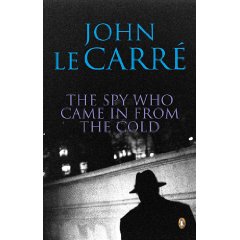Books |
John Le Carre: The Spy Who Came In from the Cold
By
Published: Sep 05, 2022
Category:
Fiction
In 1963, David Cornwell published his third novel. Because he was then an agent for British Intelligence, he used, as his government required, a pseudonym: “John Le Carré.”
Graham Greene, who pretty much invented the modern spy novel, called “The Spy Who Came in from the Cold” “the best spy story I ever read.” He understood immediately that, in a decade when James Bond was all the rage, “Spy” revolutionized the spy novel. The Bond books — and, even more, the Bond movies — were thrill rides. The suave hero never mussed his tux. He had no need to; his car had more armament than one of Patton’s brigades. The explosions that went off just a few feet from him always were just background flash. And, of course, he possessed the ultimate weapon — his deadly quips, capable of killing any villain within earshot.
For Le Carré, spycraft was the antithesis of a glamour profession. It was thinking and planning, waiting and watching, and lying — always lying. It operated by a single moral law: results. You may be assured that good people were betrayed along the way.
“Spy” was an instant classic precisely because Le Carré showed readers exactly what Intelligence is about — sometimes a roll of film, more often a list of names, never a bomb in a briefcase. Even better, it revealed how the trick is done. And, most of all, it asked a question: Us and Them — how different are we, really? [To buy the paperback from from Amazon, click here. For the Kindle edition, click here. To screen the film of “The Spy Who Came in from the Cold” from Amazon Prime, click here.]
In London, men schemed long and hard to think up ways to misdirect the Communists. In East Berlin, men much like them plotted to deceive and damage the Brits. Between them was the Wall — and a brightly lit, barb wired checkpoint.
The Wall is where this novel starts. Alec Leamas, a 50-year-old British agent, waits at the West Berlin checkpoint for a German — a British agent — who’s in danger of being found out. Tonight, he’s crossing over. You get the scene quickly: coffee, cigarettes, idle chatter. And then you see the man on a bicycle. He stops at the East Berlin gate, shows his papers, pedals on. But then he hears something. He pedals faster. Shots are fired. He sags, falls. Leamas, the ultimate realist, “hoped to God he was dead.” The career of Alec Leamas certainly is; he failed to get his man across.
And this leads to an opportunity for his employers. They would love to discredit — or, better — destroy — Mundt, head of German Intelligence in East Berlin. The way they’ll do this? Retire Leamas. Watch him sink into booze and despair. Let him be recruited by the East Germans. And then, in his debriefings, let him present these Communists with evidence that Mundt has been taking money from the Brits — that Mundt is a British agent.
This is mental chess. It calls for 24/7 acting skills. And the bar is set high. Leamas, flawlessly failing. Leamas, jailed. Leamas, released and bitter. Lemeas, expertly recruited by the Germans. Leamas, credibly sneering at his new employers. But that’s only technique. Idealism? Patriotism? Le Carré is the first modern spy novelist because he has a hard time telling the difference between the good guys — that’s us — and the Commies.
Let me interrupt to tell you something important about the author. His mother left home when he was 5 years old; he didn’t see her again until he was 21. His father was “a confidence trickster and a jailbird.” Le Carré has said: ”I was a spy before they ever recruited me. If you are brought up to believe that your home is an extremely dangerous place….” In his writing, he says, ‘I always try to identify with one character in a book and appoint him my secret sharer.” Here, that character is Alec Leamas. But here, there is also a father: Control, the head of MI5.
Levels upon levels, worlds within worlds — the experience of reading this novel is anything but relaxing. But if you’re read any of the master’s novels, you know that they deliver a kind of pleasure all their own.


